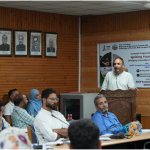In the wake of a year-long ceasefire in the border town of Uri sector, positive transformations are unfolding in the lives of its residents, igniting hopes for enhanced economic stability. Notably, the ceasefire is making a significant impact on the walnut business, fostering expectations of a bountiful harvest and increased profits for the locals.
Walnut Business Flourishing:
The hilly terrains along the Line of Control (LoC) in Uri make it conducive for growing walnuts, a major occupation for the residents. The ceasefire has allowed them to freely access their fields, leading to optimism about a successful walnut season. Shabir Ahmad Qazi, a walnut trader from Batagarh village of Uri, expressed hope for a prosperous year with the continued truce.
While the rate of walnut kernels is currently favorable at approximately Rs 1200 per kilogram, some traders in Uri market are concerned about the absence of an administrative mechanism to regulate prices.
Qazi emphasized the need for a monitoring body to ensure fair pricing, highlighting the opportunity for locals to earn a decent livelihood after several challenging years.
Haji Showkat Ahmad, a walnut trader at Lagama Uri, noted the positive impact of the ceasefire, with increased walnut supplies from villages along the LoC. Villages such as Tilawari, Nambla, Hathlanga, Soura, Thajal, Gawalta, and Gowhalan are contributing significantly to the walnut market in Uri.
Challenges in Lagama Market:
Despite the booming walnut business in the region, traders in Kashmir’s historic Lagama market, situated in the border town of Uri, are facing challenges. The market, renowned for selling the best walnut kernels in India, has experienced a decline in prices and demand, causing concern among vendors.
Mohammad Ashraf Chalkoo, a walnut seller in Lagama, expressed dissatisfaction with the falling rates, weak demand, and lack of government attention. Traders worry about the potential closure of the historic market due to recent declines.
Mohammad Ashraf revealed that the current price for one kilogram of walnut kernel is Rs 900-1000, down from the previous Rs 1400 per kilogram. The traders stressed the need for intervention from the Union Territory administration to prevent the closure of the market.
Traders in Lagama raised concerns about the central government’s import of walnut kernels from countries like Afghanistan, China, Chile, and California, negatively impacting the Kashmiri walnut industry.
They urged UT Lieutenant Governor Manoj Sinha and the horticulture department to address the situation and take necessary actions to stabilize the walnut business.
The Lagama market, housing around 70 local vendors and 34 wholesalers, offers various types of walnut kernels. The traders underscored the importance of supporting the local market over international imports to sustain their livelihoods.







